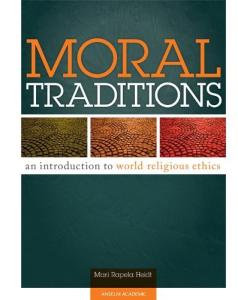Exploring Global Ethics:
A Critique of Comparative Religious Ethics
through Narrative in Fasching, deChant, and Lantigua's Book
As the world becomes increasingly interconnected, the study of religious ethics has become more important than ever. In their book, Comparative Religious Ethics: A Narrative Approach to Global Ethics, authors Fasching, deChant, and Lantigua take a unique and refreshing approach to exploring ethical systems across different religions.
Comparative Religious Ethics is a comprehensive and scholarly work that explores the ethical beliefs and practices of various religious traditions, including Hinduism, Buddhism, Judaism, Christianity, and Islam. The book explores the foundations and comparative narratives of global ethics. The book provides a detailed analysis of the ethical teachings and narratives within each religious tradition, followed by a comparative examination of these teachings.
One of the key aspects of this book is its focus on narrative. The authors argue that stories and narratives are fundamental to understanding religious ethics as they provide a deeper understanding of the values and beliefs of a particular tradition. Using narratives, the authors can highlight the similarities and differences between various religious traditions, offering a more nuanced perspective on global ethics.
One of the key insights from Comparative Religious Ethics is the idea of interconnectedness. The authors argue that all religious traditions share a common thread of interconnectedness, whether through the concept of karma in Hinduism or the belief in the oneness of humanity in Christianity. This interconnectedness is not limited to human beings but extends to the environment and all living beings. This perspective is crucial in today's world, where climate change and social justice have a global impact.
Another significant insight from the book is the idea of ethical responsibility. The authors emphasize that ethical responsibility is not just an individual duty but a collective one. This is evident in the teachings of various religious traditions, where the community's well-being precedes individual interests. Understanding ethical responsibility has essential implications for approaching global issues and conflicts.
The book also challenges the notion of a single, universal ethical system. Instead, the authors argue that each religious tradition has its unique ethical framework shaped by its history, culture, and beliefs. Understanding diversity in ethical systems can help foster a greater appreciation and understanding of different cultures and religions.
Comparative Religious Ethics is for anyone interested in the study of religion, ethics, and global issues. The book offers a comprehensive and thought-provoking analysis of various religious traditions, providing a deeper understanding of their ethical beliefs and practices. The authors' use of narratives makes the book engaging and accessible, even for readers who may not have a background in religious studies.
Moreover, the book's focus on interconnectedness and ethical responsibility is highly relevant to the challenges we face in today's world. By highlighting the interconnectedness of all living beings and the importance of collective ethical responsibility, the authors offer valuable insights on addressing global issues such as poverty, inequality, and environmental degradation.
In conclusion, Comparative Religious Ethics: A Narrative Approach to Global Ethics is a groundbreaking book offering a unique perspective on religious ethics. The authors provide a deeper understanding of global ethics by using narratives and emphasizing the interconnectedness of all living beings. This book is a must-read for anyone interested in promoting a more compassionate and just world.






